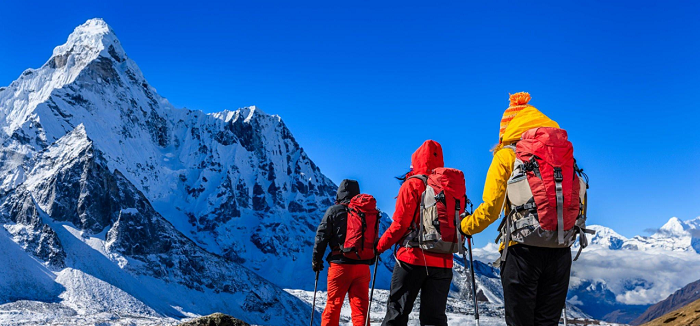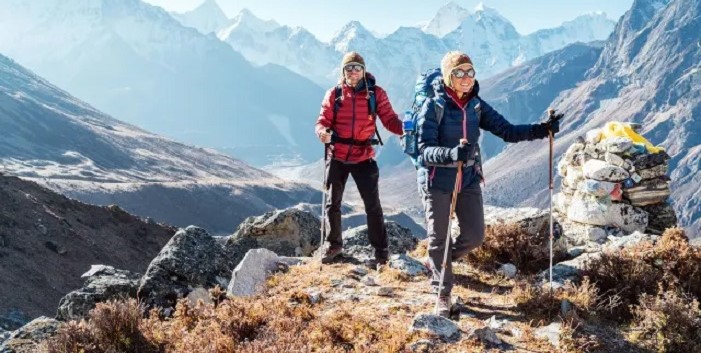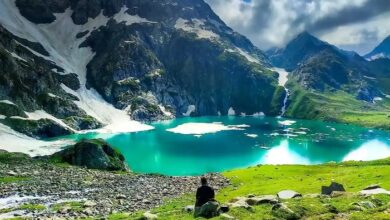Trek the Himalayas: A Life-Changing Experience

If you’ve ever dreamed of standing amidst towering peaks, breathing in crisp mountain air, and feeling one with nature, trekking in the Himalayas is an adventure you must add to your bucket list. Having been fortunate enough to experience this firsthand, I can tell you that it’s not just a trek; it’s a journey that stays with you forever. Let me walk you through what makes trekking in the Himalayas so special, how to prepare, and some of my favorite trails.

Why Trek the Himalayas?
The Himalayas are more than just mountains; they’re a place of unparalleled beauty, culture, and spirituality. Here are a few reasons why trekking here is an unforgettable experience:
1. Stunning Natural Beauty
The Himalayas are home to snow-capped peaks, lush valleys, pristine rivers, and vibrant forests. The ever-changing landscapes will leave you in awe. Every turn on the trail brings something new and breathtaking.
2. Cultural Immersion
Trekking in the Himalayas isn’t just about nature. It’s a chance to experience the rich traditions of mountain communities. The warm hospitality of the locals, their simple lifestyle, and unique customs will give you a deeper appreciation for life.
3. Personal Growth
A Himalayan trek is physically demanding but equally rewarding. It pushes your limits, teaches resilience, and offers a sense of accomplishment that’s hard to describe. By the time you finish, you’ll have grown both physically and mentally.
Popular Himalayan Trekking Routes
There are countless trekking routes in the Himalayas, each offering something unique. Here are a few of my favorites:
1. Everest Base Camp (Nepal)
This iconic trek takes you to the base of the world’s highest peak, Mount Everest. It’s a challenging journey but offers unmatched views of the Himalayas and a close encounter with Sherpa culture.
2. Chadar Trek (India)
This winter trek in Ladakh involves walking on the frozen Zanskar River. It’s an adventure like no other, with icy caves, waterfalls, and surreal landscapes.
3. Annapurna Circuit (Nepal)
Known for its diversity, the Annapurna Circuit takes you through lush forests, terraced fields, and arid landscapes, all while offering majestic mountain views.
4. Hampta Pass (India)
If you’re a beginner, the Hampta Pass trek in Himachal Pradesh is a great choice. It’s a short trek with varied terrains, from green valleys to snowy passes.
5. Goechala Trek (India)
This trek in Sikkim offers stunning views of Mount Kanchenjunga, the third-highest peak in the world. The trail is dotted with rhododendron forests and serene lakes.
Preparing for a Himalayan Trek
Trekking in the Himalayas requires preparation. Here’s how to get ready:
1. Physical Fitness
Start training at least 2-3 months before your trek. Focus on building stamina through cardio exercises like running or cycling. Strength training for your legs and core is also essential.
2. Packing the Essentials
Invest in good-quality gear. Key items include:
- A sturdy backpack
- Comfortable trekking shoes
- Warm clothing (layering is crucial)
- Sleeping bag
- First-aid kit
- Snacks and water bottle
3. Acclimatization
Altitude sickness is a real concern in the Himalayas. Take your time to acclimatize, stay hydrated, and listen to your body. Avoid rushing to higher altitudes.
4. Research and Planning
Choose a trek that matches your fitness level and interests. Research the route, weather conditions, and cultural norms. Hiring a guide or joining a group can make the experience smoother and safer.
My Most Memorable Experience
One of my most cherished memories is from the Kedarkantha trek in Uttarakhand, India. It was my first winter trek, and the snow-covered trails felt like something out of a fairy tale. Reaching the summit at sunrise, with a 360-degree view of the Himalayas, was magical. It’s a moment that still gives me goosebumps when I think about it.
Tips for First-Time Trekkers
If you’re new to trekking, here are some tips to make your experience enjoyable:
- Start Small: Choose an easier trek to build confidence.
- Stay Positive: The trails can be tough, but keep a positive mindset.
- Respect Nature: Leave no trace and respect local customs.
- Be Prepared: Always carry extra food, water, and warm clothing. Read More




